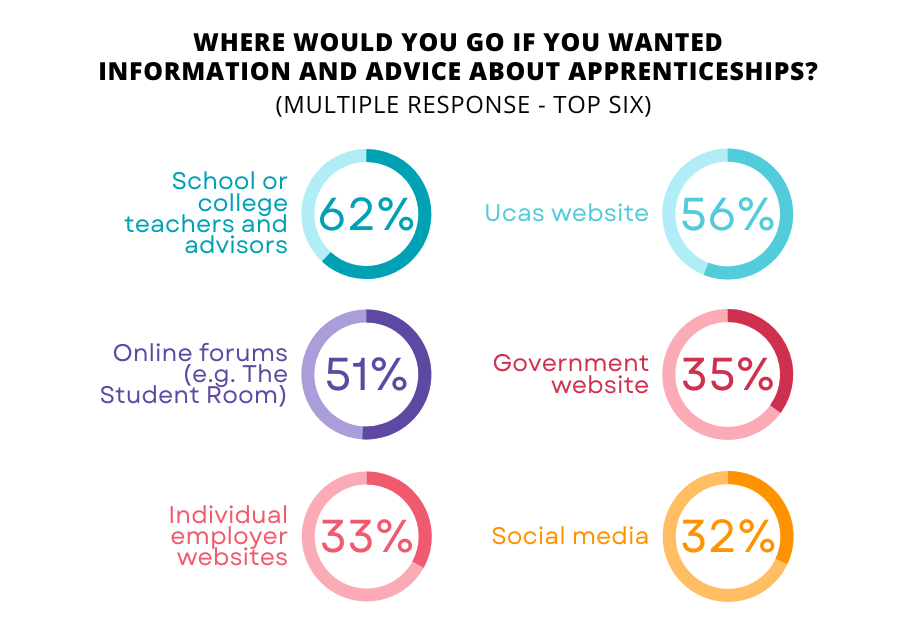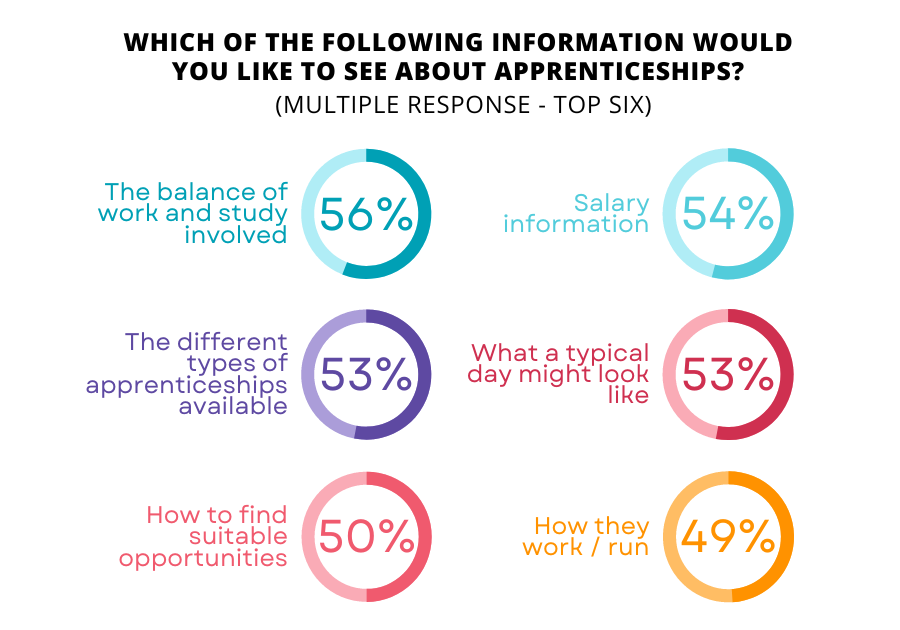Published 06 March 2023
Over half a million students have just submitted their Ucas applications, but there are still plenty of young people who aren’t planning on going to university.
Government data shows that around a third of those aged 19+ in further education and skills last year were in apprenticeships. And in our January research, a similar amount of young people (35%) we spoke to said they were considering taking one.
31% would consider a higher or degree apprenticeship, while 11% were thinking about an advanced apprenticeship.
Here we’ll share what young people have been telling us about how they get their information about apprenticeships, what they want to know about them and how likely they are to find a suitable one.¹
How keen are they?
Young people are interested in apprenticeships. However, our data shows they’re considering a number of different pathways.
63% of young people we spoke to said they had looked for information about apprenticeships, but nearly all of them (94%) had researched university. What we see on The Student Room suggests that while some will only consider going to university, others are likely to be more open to exploring their options.
Our apprenticeships and alternatives to university forum receives 80,000 page views a month and is growing in popularity. We often see comments such as these:
“I’ve heard getting an apprenticeship is really competitive so I want to apply to loads but also don’t know if I should focus on just a few.”
“I am thinking about doing an apprenticeship but I always hear that it’s for people that can’t make it to university and that without a degree I cannot pursue a good career with a bright future.”
“I’m mostly wondering about how manageable the workload and studying is and level of difficulty? I also want tips on getting selected as they’re very competitive.”
Young people also find it much easier to research university, which we might assume – if the questions they have about apprenticeships don’t get answered – could influence decision making. In our January research, only 40% found it very or quite easy to find information about apprenticeships, compared to 81% for university.
So how do you make information easier to find? You need to know where young people would look for information.

Where are young people getting information from?
We asked young people where they would go to get information about apprenticeships. They told us they would go to teachers or advisors (62%), the Ucas website (56%) and online forums such as The Student Room (51%).
Almost two thirds (63%) had already received information about apprenticeships from their school or college. If you’re looking to boost the visibility of specific apprenticeship opportunities, sharing those details with teachers can really help young people make informed decisions about their future.
The majority of these respondents (86%) would look online for information about apprenticeships, so work with third-party websites such as Ucas to make it easier for young people to find guidance and have an active presence on The Student Room to directly answer questions.

What do they want to know?
Practical experience is a unique part of taking an apprenticeship, so capitalise on it by providing in-depth detail about the work involved in the role.
According to our January research, respondents wanted an understanding of the day-to-day logistics, including the balance of work and study involved (56%), what a typical day would look like (53%) and how apprenticeships are run (49%).
They also want to hear about salaries (54%), the different types of apprenticeships (53%) and how to find suitable opportunities (50%).
Make sure you tell interested prospective apprentices what jobs are available and where to find them, as well how much they’ll get paid. The more you describe the job, the better.

So what’s stopping them from applying?
Finding suitable apprenticeships is a big barrier. Just 11% of the young people we spoke to knew where to find vacancies and only 22% felt there were plenty of apprenticeship opportunities available.
The struggle to find opportunities means they could be seen as limited. Around half of respondents (47%) thought it was hard to find apprenticeships that suit their own interests, and 40% felt that applications for apprenticeships were competitive.
Not only did the young people we spoke to find information about university more readily available, around one third thought it would be easier to secure a place at university than get an apprenticeship (32%). Just 27% of those we spoke to were confident they could find an apprenticeship if they wanted one.
For apprenticeships to be more accessible, vacancies need to be easier to find with detailed descriptions about day-to-day life in the role.
Key takeaways
- 63% of young people we spoke to had looked for information about apprenticeships, but they find it much easier to research university.
- Potential apprentices would go to teachers, the Ucas website and online forums like The Student Room for information about apprenticeships. Use these sources to make detailed information about opportunities readily available.
- Respondents were most interested in the day-to-day logistics of an apprenticeship, so give an insight into balance of work and study, what a typical day looks like and how much they’ll get paid.
- Most don’t know where to find vacancies, which makes availability seem limited and competitive compared to a place at university – only 27% of students we spoke to were confident they could find an apprenticeship if they wanted one.
1 All of the research in this article is from the 1,118 responses to TSR Asks, January 2023. Download the summary of findings in our Research hub

